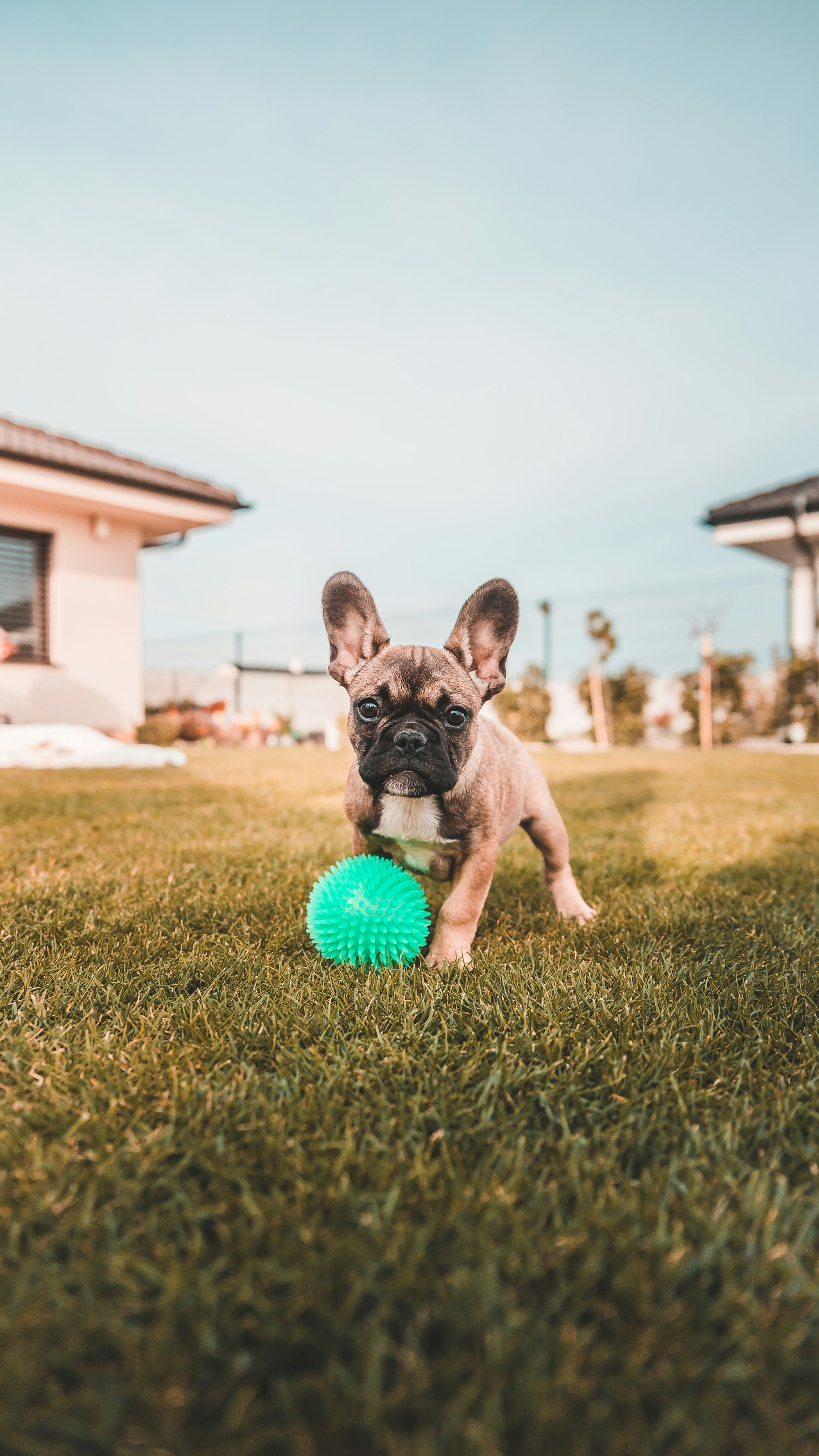Are you ready for some puppy talk? If you're a fan of the French Bulldogs, you're in for a treat! These adorable little pups are known for their charming personalities and irresistible squishy faces, but just how many of them can one Frenchie mama have?
In this article, we'll explore the fascinating world of French Bulldog litters and answer the burning question on every dog lover's mind: how many puppies can a French Bulldog have? Get ready to unleash your curiosity and let's dive in!
How Many Puppies Can French Bulldogs Have in a Litter?
On average, a French Bulldog can have a litter size of between 2 to 4 puppies. However, it's not uncommon for some Frenchies to have larger litters of up to 5 or 6 puppies, while others may only have a single pup.
French Bulldogs are known for being small, compact dogs with a big personality, and when it comes to their litters, they tend to have a smaller number of puppies compared to other breeds.
There are several factors that can influence the size of a French Bulldog's litter, including genetics, age, and overall health. For instance, younger Frenchies and those in peak physical condition tend to have larger litters than older or less healthy dogs.
It's worth noting that while having a larger litter may seem exciting, it can also come with some challenges. French Bulldogs, like many small breeds, can experience difficulties during labor and delivery, so it's important for breeders and pet owners to work closely with a veterinarian to ensure a safe and healthy birth for both the mother and her puppies.

How Many Puppies in a French Bulldog's Lifetime?
On average, a French Bulldog can have up to 4 litters in their lifetime, with each litter having between 2 to 4 puppies. This means that a Frenchie can have anywhere from 8 to 16 puppies over the course of their breeding years.
However, it's important to note that breeding a dog should be done with careful consideration and only under the guidance of a responsible breeder or veterinarian. Overbreeding can be harmful to a French Bulldog's health, and can also contribute to the problem of overpopulation in the dog breeding industry.
It's also important to consider the ethical implications of breeding dogs, including the responsibility of finding suitable homes for each puppy and ensuring that they receive proper care throughout their lifetime.

Factors That Affect the Litter Size
There are several factors that can affect the litter size of a French Bulldog, including:
- Age: As a general rule, younger female dogs tend to have larger litters than older dogs. This is because their reproductive systems are more efficient when they are in their prime.
- Health: A French Bulldog's overall health can play a significant role in the size of their litters. Dogs that are in good physical condition are more likely to have larger litters than those who are not.
- Genetics: The genetics of the dog can also impact litter size. Some dogs may have a genetic predisposition to smaller litters, while others may be more likely to have larger litters.
- Nutrition: A well-balanced diet is essential for a French Bulldog's health and can also impact litter size. A dog that is malnourished or underweight may have smaller litters or may experience complications during pregnancy.
- Breeding frequency: French Bulldogs that are bred too frequently may experience smaller litters due to a decline in fertility. It's important to give the female dog enough time to recover and regain their health between breeding cycles.
- Breeding method: The method used for breeding can also affect the litter size. Artificial insemination may result in smaller litter sizes than natural breeding.
Hormone Imbalance
Hormone imbalances can also be a factor that affects the litter size of French Bulldogs. Hormones play a critical role in the reproductive system of dogs, and any imbalances can lead to reduced fertility and smaller litter sizes.
One hormone that is particularly important in female dogs is progesterone. Progesterone levels rise during the second half of a dog's reproductive cycle, and they play a key role in preparing the uterus for pregnancy. If progesterone levels are too low, the uterus may not be ready to support a litter, resulting in smaller litters or even infertility.
Another hormone that can affect litter size is luteinizing hormone (LH). LH is responsible for triggering ovulation, and if levels are too low, ovulation may not occur, leading to smaller litters or infertility.
In addition to these hormones, imbalances in other hormones such as estrogen, follicle-stimulating hormone (FSH), and thyroid hormones can also affect a French Bulldog's reproductive system and ultimately impact litter size.
If a hormonal imbalance is suspected, a veterinarian can perform tests to determine the levels of various hormones and recommend appropriate treatments or management strategies to support the dog's reproductive health.
Age
Female dogs are most fertile between the ages of 2 and 5 years old, and during this time, they are more likely to have larger litters. As dogs age, their fertility decreases, and they may experience smaller litter sizes or infertility.
It's important to note that breeding French Bulldogs before they are fully mature can also have negative consequences. Breeding dogs that are too young can result in smaller litter sizes, and it can also put the mother and puppies at greater risk for complications during pregnancy and delivery.
On the other hand, breeding dogs that are too old can also increase the risk of complications and smaller litter sizes. Female dogs that are past their prime reproductive years may have a reduced number of eggs, and their uterus may not be as capable of supporting a large litter.
In general, the ideal age for breeding French Bulldogs is between 2 and 5 years old, when the dog is in optimal reproductive health. However, it's important to work closely with a veterinarian or responsible breeder to ensure that the dog is physically and emotionally ready for breeding, regardless of their age.

Genetics
The number of puppies that a Frenchie has in a litter can be influenced by the genetics of both the female and male dogs involved in breeding.
In general, large dog breeds tend to have larger litters than smaller breeds, and this can be reflected in the litter size of mixed-breed puppies. However, French Bulldogs are a relatively small breed, and their litter sizes are typically smaller than those of larger breeds.
The genetics of the female dog can also play a significant role in litter size. Some French Bulldogs may be more predisposed to having smaller litters due to their genetics. In contrast, other dogs may be more likely to have larger litters. Genetic testing can help breeders to identify dogs with optimal reproductive health and litter size.
Health
A Frenchie that is in good physical condition is more likely to have larger, healthier litters than a dog that is not.
Dogs that are malnourished, underweight, or have an underlying health condition may have reduced fertility, which can lead to smaller litters or infertility. Proper nutrition, exercise, and regular veterinary care can help to ensure that a French Bulldog is in good health and ready for breeding.
It's also important to note that French Bulldogs, like all breeds of dogs, can experience reproductive health issues that can impact their litter size. Conditions such as infections, tumors, or abnormalities in the reproductive system can reduce fertility and result in smaller litters. Regular veterinary checkups and reproductive health screenings can help to identify and address these issues early on, improving the chances of a successful breeding.
In addition to physical health, a Frenchie's mental and emotional wellbeing can also play a role in their reproductive health. Dogs that are stressed, anxious, or in poor mental health may experience reduced fertility, and this can impact their litter size. It's important to ensure that the dog's environment is safe, comfortable, and conducive to their overall health and wellbeing.
How Are Exotic French Bulldog Colors Made When Breeding?
The process of breeding for these colors can be complex, and it often involves breeding dogs that carry specific color genes. For instance, a blue merle French Bulldog may carry two copies of the dilute gene, while a lilac Frenchie may carry one copy of the dilute gene and one copy of the chocolate gene.
Breeding for exotic colors or even fluffy coats can also involve the use of artificial insemination or the use of stud dogs that are carriers of the desired color genes. However, it's important to note that breeding for these colors can come with some risks. French Bulldogs that are bred specifically for their color may be more prone to health issues, including skin problems and eye disorders.
In addition, the popularity of exotic colors like the platinum coloring has led to an increase in the demand for these dogs, which has resulted in some breeders engaging in unethical breeding practices, such as inbreeding or breeding for extreme physical characteristics. These practices can be harmful to the health and welfare of the dogs and can result in a range of health issues.
It's important to work with a responsible breeder who prioritizes the health and wellbeing of the dogs above all else.
Is Breeding Micro French Bulldogs Safe?
Breeding for extremely small size can increase the risk of a number of health problems in French Bulldogs, including respiratory issues, hip dysplasia, and spinal problems. Additionally, breeding micro French Bulldogs with a focus on appearance rather than health and temperament can lead to a range of serious health problems that can negatively impact both the mother and the puppies.
Responsible breeders prioritize the health and well-being of the breed and carefully select breeding pairs based on factors such as health, temperament, and genetic diversity. Breeding French Bulldogs for extremely small size or for specific coat colors can compromise their health and result in a host of problems that can be detrimental to their overall well-being.

When Do Female Frenchies Come Into Breeding Maturity?
Female French Bulldogs typically reach sexual maturity between 6 and 12 months of age. However, it's important to note that while a female dog may be physically capable of breeding at this age, it's generally recommended to wait until the dog is at least 2 years old before breeding.
Breeding a Frenchie too early can have negative consequences, including a higher risk of complications during pregnancy and delivery. Additionally, dogs that are bred too young may not be emotionally or mentally mature enough to handle the demands of pregnancy and motherhood.
Why is Natural Birth So Dangerous for Frenchies?
French Bulldogs, like many brachycephalic (short-nosed) breeds, are at increased risk for complications during natural birth due to the shape of their skulls and bodies. The breed's unique anatomy can make natural birth dangerous and potentially life-threatening for both the mother and her puppies.
French Bulldogs have a relatively large head and narrow pelvis, which can make it difficult for puppies to pass through the birth canal. This can result in prolonged labor and increased risk of fetal distress, stillbirth, or death of the mother.
In addition to the breed's physical anatomy, French Bulldogs can also be prone to certain health issues that can increase the risk of complications during natural birth. For instance, obesity, poor nutrition, and other health issues can increase the risk of complications during pregnancy and delivery.
For these reasons, many veterinarians and responsible breeders recommend that French Bulldogs give birth via cesarean section (C-section). A C-section is a surgical procedure that involves delivering the puppies via incision in the mother's abdomen, and it can greatly reduce the risks associated with natural birth.

The First Month of French Bulldog Pregnancy
During the first month of French Bulldog pregnancy, the fertilized eggs travel down the Fallopian tubes and implant in the lining of the uterus. At this point, it can be difficult to detect pregnancy as there are no external signs. However, some dogs may exhibit subtle changes in behavior or appetite.
It's important to ensure that the dog is getting proper nutrition and exercise during this time, as this will support the health of both the mother and the developing fetuses. It's also a good time to schedule a veterinary checkup to confirm the pregnancy and monitor the dog's health.
The Second Month of French Bulldog Pregnancy
By the second month of French Bulldog pregnancy, the fetuses have developed significantly and are about the size of walnuts. The dog's abdomen may begin to swell, and she may exhibit signs of morning sickness or fatigue.
During this time, it's important to continue to provide the dog with proper nutrition and exercise, and to monitor her health closely. The veterinarian may recommend additional testing, such as an ultrasound, to monitor the health and development of the fetuses.
The Third Month of French Bulldog Pregnancy
During the third month of French Bulldog pregnancy, the fetuses continue to develop rapidly, and their organs and body systems begin to mature. The dog's abdomen will be noticeably swollen, and she may begin to experience nesting behavior as she prepares for the birth of her puppies.
It's crucial to continue to monitor the dog's health and provide her with proper nutrition and exercise during this time. The veterinarian may recommend additional testing or monitoring to ensure the health and wellbeing of the mother and her puppies.
Please Breed Your French Bulldog Responsibly
Breeding French Bulldogs is a complex and challenging process that requires careful consideration and responsible practices. The health and welfare of the dogs should always be the top priority, and breeders and pet owners should work closely with a veterinarian or experienced breeder to ensure that the breeding process is done safely and ethically.
Breeding French Bulldogs can be a rewarding experience, but it's crucial to approach it with caution and responsibility. Overbreeding, breeding for profit or for the sole purpose of producing exotic colors, and engaging in unethical breeding practices can all have negative consequences for the health and wellbeing of the dogs involved.
It's important to prioritize the health and wellbeing of the dogs above all else and to ensure that they receive proper nutrition, exercise, and veterinary care throughout their lives. By working with responsible breeders and veterinarians and by following ethical breeding practices, we can help to ensure a healthy and happy future for French Bulldogs and other breeds of dogs.
Final Thoughts
French Bulldogs are a popular breed of dog that many people are interested in owning. However, it's important to keep in mind that Frenchies can be quite expensive, with prices ranging from a few thousand dollars to upwards of $10,000 for a purebred puppy. This is due to their popularity and the high demand for these dogs. If you're on a budget, you may want to consider adopting a Frenchton, which is a crossbreed between a French Bulldog and a Boston Terrier. These dogs can be just as cute and playful as purebred Frenchies, but may be more affordable.
It's also important to note that French Bulldogs often require c-sections to give birth, as their puppies have large heads and broad shoulders that make natural delivery difficult. This can add to the cost of owning a French Bulldog, as c-sections can be expensive and require careful monitoring and recovery.
If you're considering getting a French Bulldog or any other dog breed, it's important to do your research and be prepared for the responsibilities of dog ownership. This includes providing proper care and training for your dog, as well as ensuring that you can afford any medical expenses that may arise. Keep in mind that there are many other dog breeds to choose from, each with their own unique characteristics and needs. Consider researching other breeds that may be a better fit for your lifestyle and budget before making a decision.
Get more expert advice on pet-parenting by visiting the Off Leash blog at TryFi.com.
TryFi's The Fi Dog Collar is a must-have for any pet parent- it is a GPS tracking collar that helps you keep tabs on your dog's location, activity, and sleep patterns, and alerts you if they escape your backyard. Try the Fi Dog Collar today!






